Emergency HVAC Sandy
Top After Hours HVAC in Sandy
Receive up to 3 24/7 HVAC Repair quotes for your project today! Compare profiles, reviews, accreditations, portfolio, etc... and choose the best service.
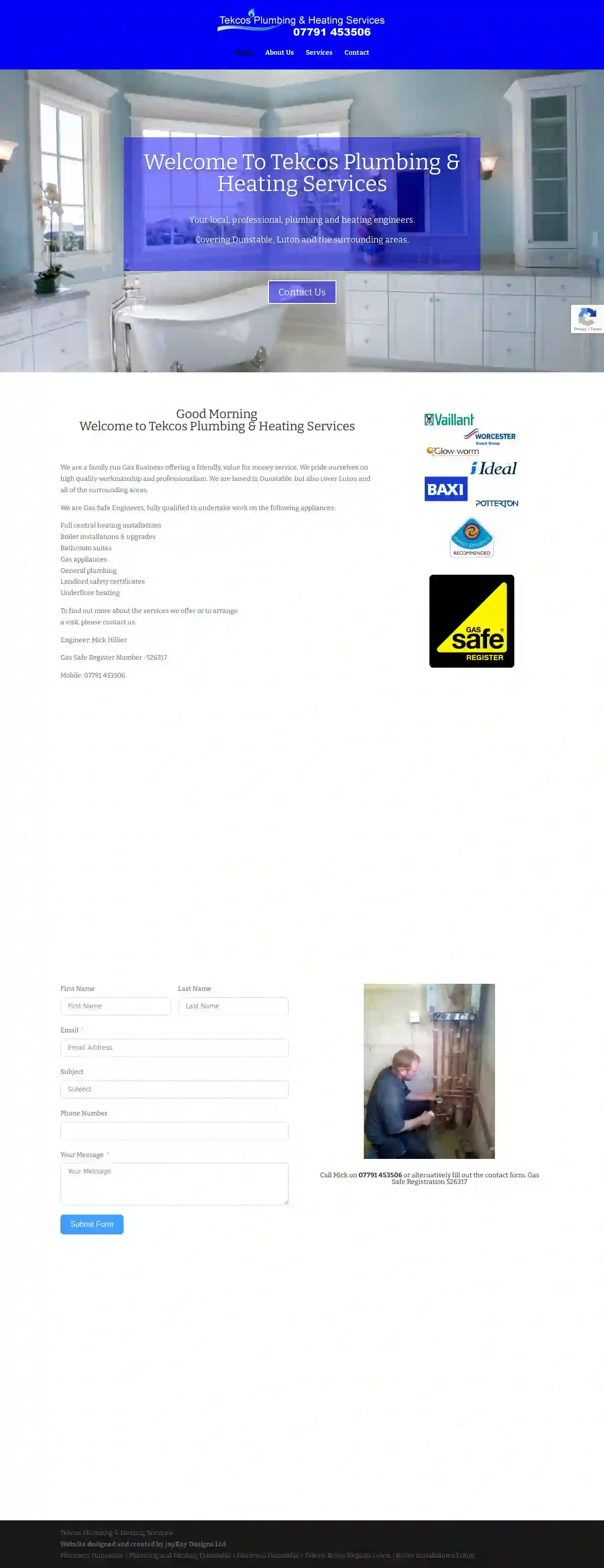
Tekcos (Plumbing & Heating & Electrical) Ltd
51 reviewsDunstable, GBWelcome to Tekcos Plumbing & Heating Services, your local, professional, plumbing and heating engineers. We specialise in boilers and all aspects of domestic plumbing and heating work. Our family run Gas Business offers a friendly, value for money service, with high quality workmanship and professionalism. We are based in Dunstable, but also cover Luton and all of the surrounding areas. We are Gas Safe Engineers, fully qualified to undertake work on the following appliances: full central heating installations, boiler installations & upgrades, bathroom suites, gas appliances, general plumbing, landlord safety certificates, underfloor heating. To find out more about the services we offer or to arrange a visit, please contact us.
- Services
- Why Us?
- Accreditations
- Our Team
- Gallery
Get Quote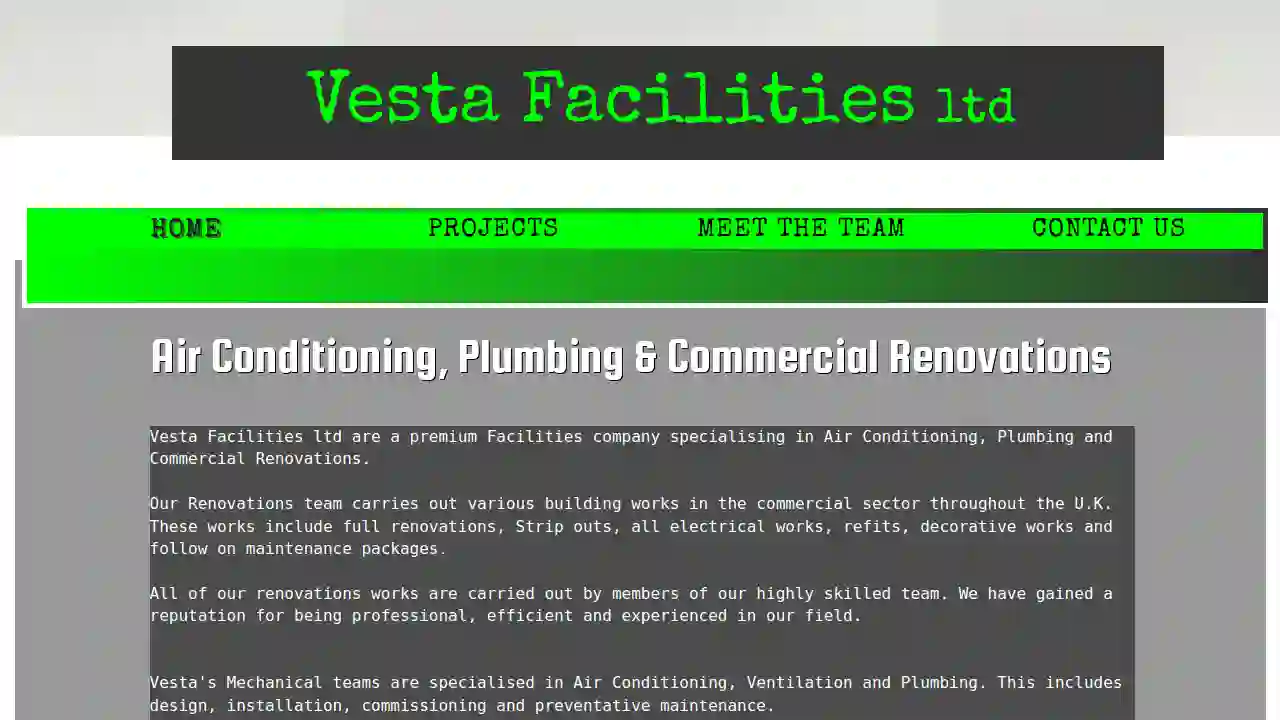
Vesta Facilities Ltd
51 reviewsUnit 42 Icknield Way Farm, LU6 2JX, GBVesta Facilities Ltd is a premium Facilities company specialising in Air Conditioning, Plumbing and Commercial Renovations. Our Renovations team carries out various building works in the commercial sector throughout the U.K. These works include full renovations, Strip outs, all electrical works, refits, decorative works and follow on maintenance packages. All of our renovations works are carried out by members of our highly skilled team. We have gained a reputation for being professional, efficient and experienced in our field. Vesta's Mechanical teams are specialised in Air Conditioning, Ventilation and Plumbing. This includes design, installation, commissioning and preventative maintenance. We offer services for Heating and Ventilation. This covers all gas works, Boiler installations, maintenances and servicing. Vesta can accommodate all of your Air conditioning, Ventilation and Commercial Plumbing needs. We have the capacity to run large scale commercial projects and offer follow up premium maintenance packages. At Vesta Facilities our staff are handpicked for their experience, knowledge and professionalism. This means we can also ensure our team are highly qualified and up to date with the latest training in their specialised fields. Your project will be over seen by our extremely professional management team. Pop over to the 'Meet the Team' page to see who will be working on your project. Our expert, highly qualified engineers can advise and install both small scale and large high-end projects. This ensures our products are tailored to make your working or living environments perfect for your needs. We have vast experience working on both large industrial scale projects, Retail units, Comms/server rooms and residential properties. This includes Film studios, prestigious luxury apartments and houses, landmark hotels and commercial units. Vesta Facilities offer 24/7 365 days a year cover for commercial emergency call outs. We are extremely proud to be accredited by Safe Contractor and Construction Line. We are also registered with Refcom. Vesta Facilities offer a professional, free, no obligation site survey. This will establish your needs to ensure you receive the products to suit your requirements and give you the best price.
- Services
- Why Us?
- Accreditations
- Our Team
- Gallery
Get Quote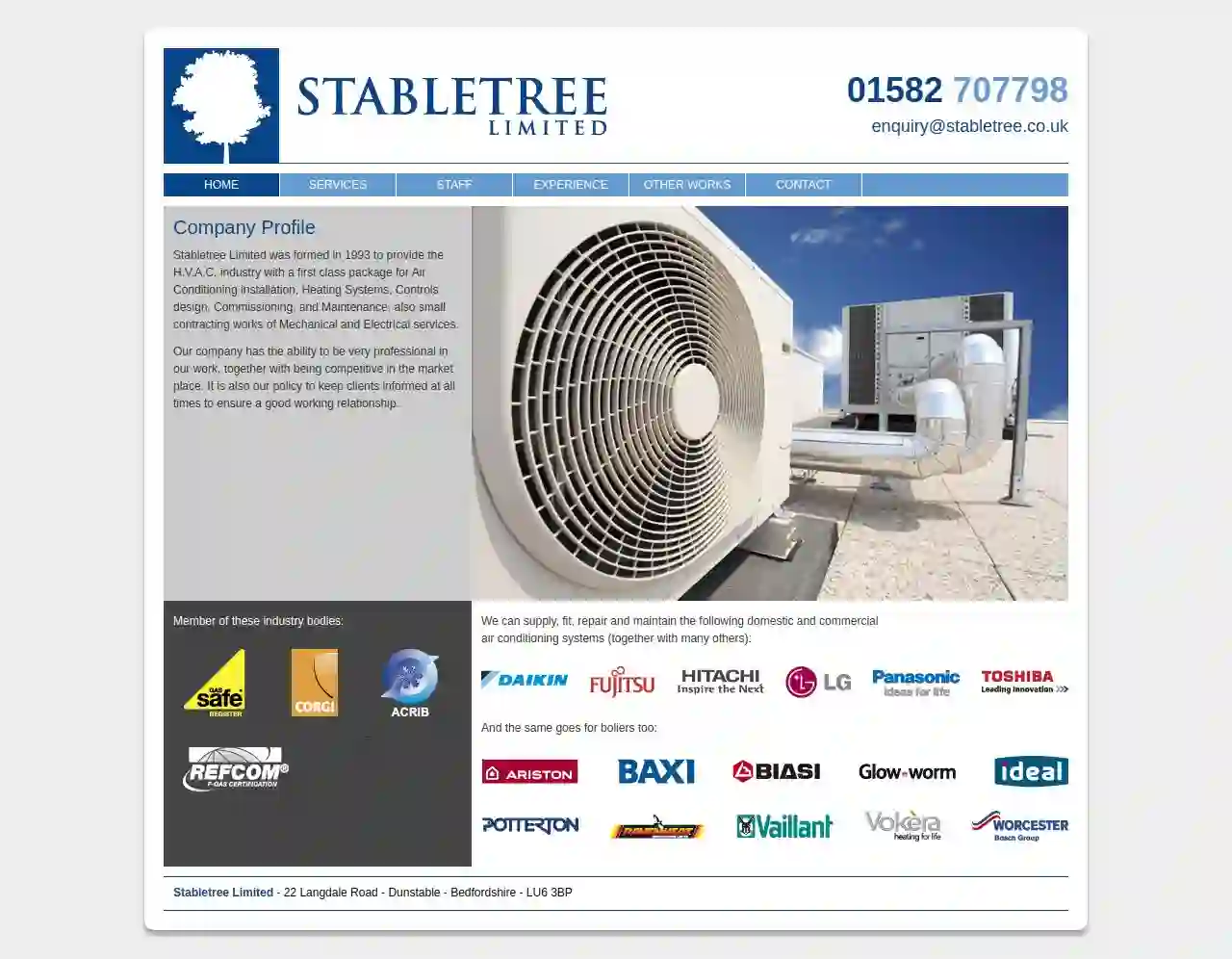
Stabletree Limited
22 Langdale Road, Dunstable, LU6 3BP, GBStabletree Limited was formed in 1993 to provide the H.V.A.C. industry with a first class package for Air Conditioning installation, Heating Systems, Controls design, Commissioning, and Maintenance, also small contracting works of Mechanical and Electrical services. Our company has the ability to be very professional in our work, together with being competitive in the market place. It is also our policy to keep clients informed at all times to ensure a good working relationship.
- Services
- Why Us?
- Accreditations
- Our Team
- Gallery
Get Quote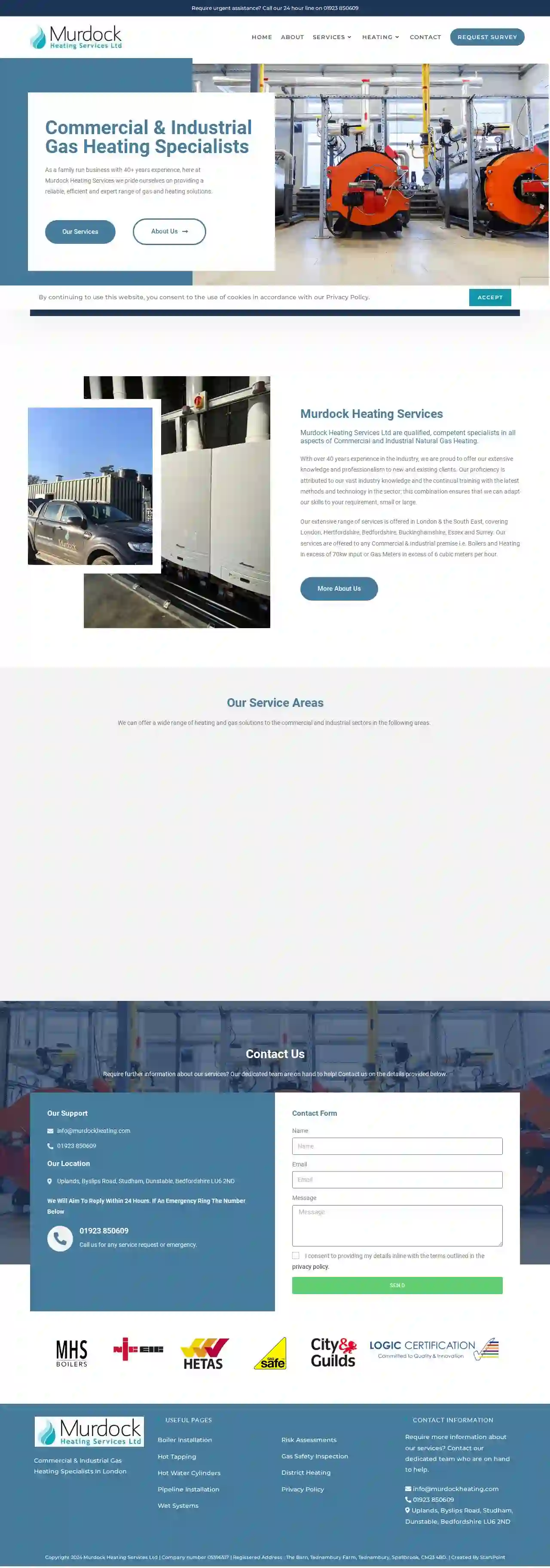
Murdock Heating Services
53 reviewsUplands, Byslips Road, Studham, Dunstable, LU6 2ND, GBMurdock Heating Services Ltd are qualified, competent specialists in all aspects of Commercial and Industrial Natural Gas Heating. With over 40 years experience in the Industry, we are proud to offer our extensive knowledge and professionalism to new and existing clients. Our proficiency is attributed to our vast industry knowledge and the continual training with the latest methods and technology in the sector; this combination ensures that we can adapt our skills to your requirement, small or large. Our extensive range of services is offered in London & the South East, covering London, Hertfordshire, Bedfordshire, Buckinghamshire, Essex and Surrey. Our services are offered to any Commercial & Industrial premise i.e. Boilers and Heating in excess of 70kw input or Gas Meters in excess of 6 cubic meters per hour. We take extreme pride in our approach; we listen to your requirements and expectations, and advise through our experience, the best viable and deliverable solution to include cost and energy efficiency. We offer an efficient, professional, and reliable service and all works are of the highest standard; as dictated by Industry Regulations. Our due diligence ensures all works meet with Health & Safety Standards and the current Legislation. Murdock Heating Services Ltd are proud to be registered with, and or members of Gas Safe Register, WRAS and IGEM. All Engineers are registered under the Murdock Heating Services Ltd Gas Safe Licence. Our qualifications have been gained with Logic and Adrian Brown Training. Our client basis is varied and works undertaken range from Fault Diagnosis to Complete Installation; building types include: Hotels, Care Homes, Stately Homes, Commercial & Industrial Manufacturing Units, Shopping Centres, Offices, large or small, Leisure Centres, and Workshops.
- Services
- Why Us?
- Accreditations
- Gallery
Get Quote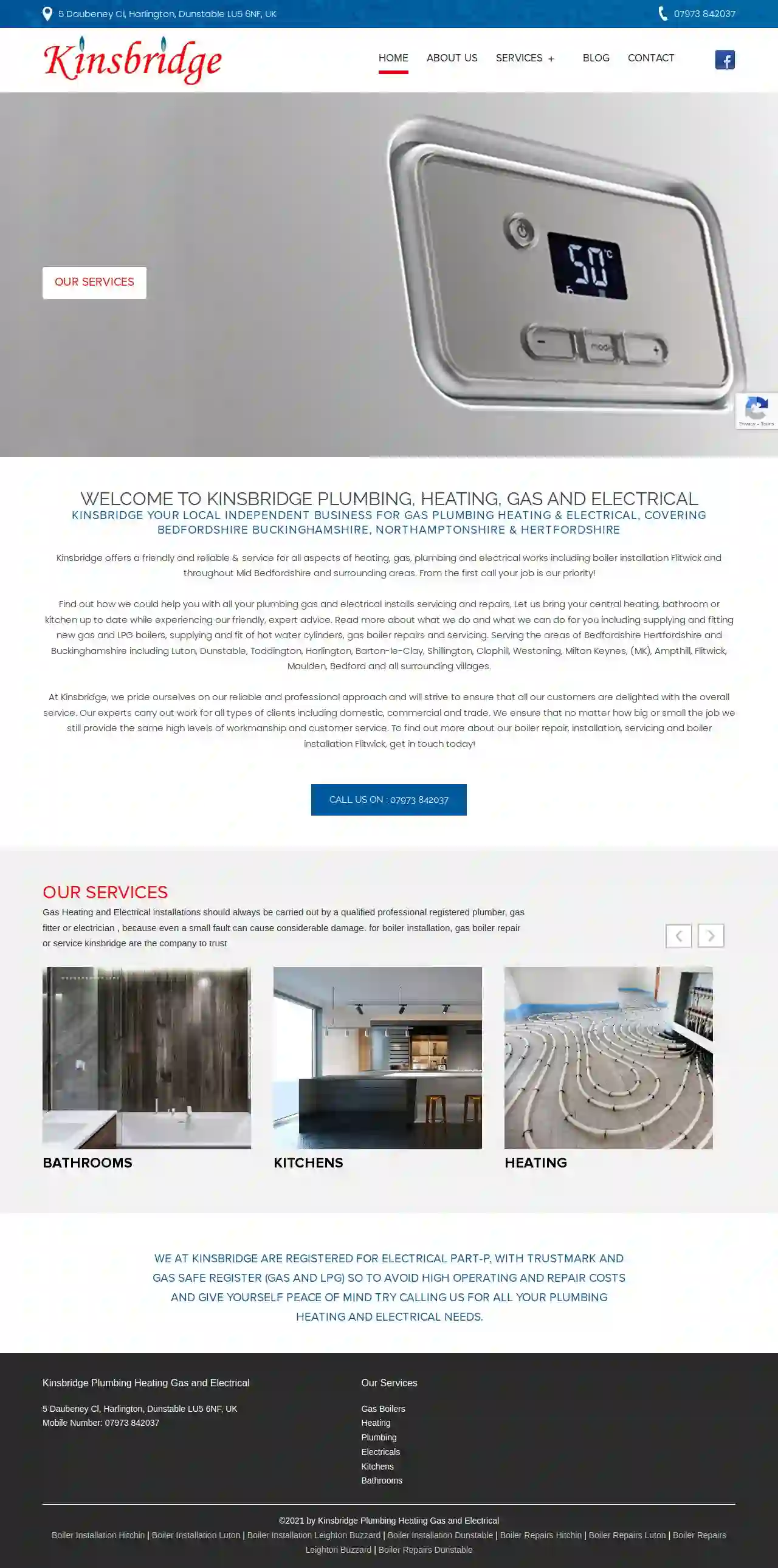
Kinsbridge Plumbing Heating Gas and Electrical
4.927 reviews5 Daubeney Cl, Harlington, LU5 6NF, GBWelcome to Kinsbridge Plumbing, Heating, Gas and Electrical, your local independent business for gas, plumbing, heating & electrical, covering Bedfordshire, Buckinghamshire, Northamptonshire & Hertfordshire. We offer a friendly and reliable service for all aspects of heating, gas, plumbing and electrical works, including boiler installation, Flitwick and throughout Mid Bedfordshire and surrounding areas. Our experts carry out work for all types of clients, including domestic, commercial and trade. We pride ourselves on our reliable and professional approach and strive to ensure that all our customers are delighted with the overall service.
- Services
- Why Us?
- Accreditations
- Gallery
Get Quote
Phoenix Heating luton Ltd
4.85 reviewsBlackburn Road, Unit 5 Townsend Centre, Houghton Regis, LU5 5BQ, GBEstablished in 1985, Phoenix Heating (Luton) Ltd is a family-run business catering to all the heating and plumbing requirements of industrial and commercial establishments. Our heating engineers specialise in commercial and industrial heating, including complete boiler or plant room installation, industrial pipe fitting, gas purge and safety checks. Throughout our years of experience, we have developed a great reputation for our work on heating installation projects, providing commercial heating installations that last the test of time. We Look after Schools, Academies and colleges If you are looking for a competent company that can provide you with evidence of the correct training and certificates, we pride ourselves on working with current codification. Safe Guarding IOSH Ipaf £10M Insurance CSCS Gas Safe DBS Water Regulation Schools Hospital Churches Care homes Surgeries Offices Industrial buildings Local authorities approved
- Services
- Why Us?
- Accreditations
- Gallery
Get Quote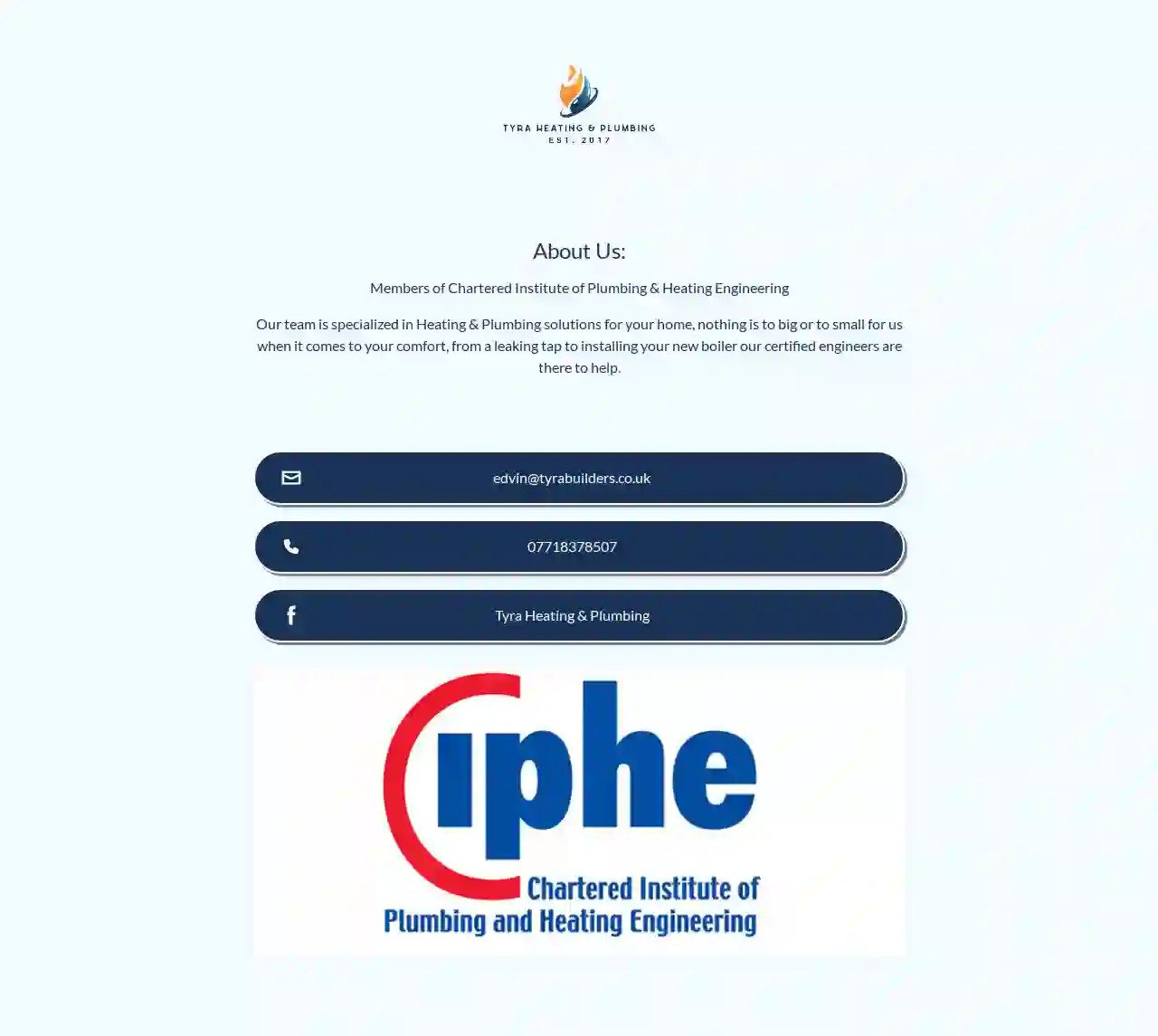
Tyra Heating & Plumbing
Dunstable, GBTyra Heating & Plumbing is a team of certified engineers specializing in heating and plumbing solutions for your home. No job is too big or too small for us, from a leaking tap to installing your new boiler, we are here to help ensure your comfort.
- Services
- Why Us?
- Our Team
- Gallery
Get Quote
Impulse Heating
56 reviewsThe Business Centre, 1000 Chester Road, Unit 10, Birmingham, B37 6AA, GBImpulse Heating Ltd is a family-run business with over 20 years of experience in the heating industry. We are based in the heart of the UK and provide a wide range of heating services to both domestic and commercial clients. Our team of highly skilled engineers is dedicated to providing our customers with the highest quality service at competitive prices. We are committed to providing our customers with a reliable and efficient service, and we are always happy to go the extra mile to ensure that they are satisfied. We offer a 24/7 emergency call-out service, so you can be sure that we are always there when you need us. At Impulse Heating Ltd, we believe that everyone deserves to be warm and comfortable in their home or business. That's why we offer a wide range of heating services, including boiler installations, repairs, and servicing. We also offer a range of other services, such as gas safety checks and power flushing. We are a Gas Safe registered company, so you can be sure that you are in safe hands. We are proud to be a family-run business, and we are committed to providing our customers with the highest level of service. We are always happy to answer any questions you may have, and we are always willing to go the extra mile to ensure that you are satisfied.
- Services
- Why Us?
Get Quote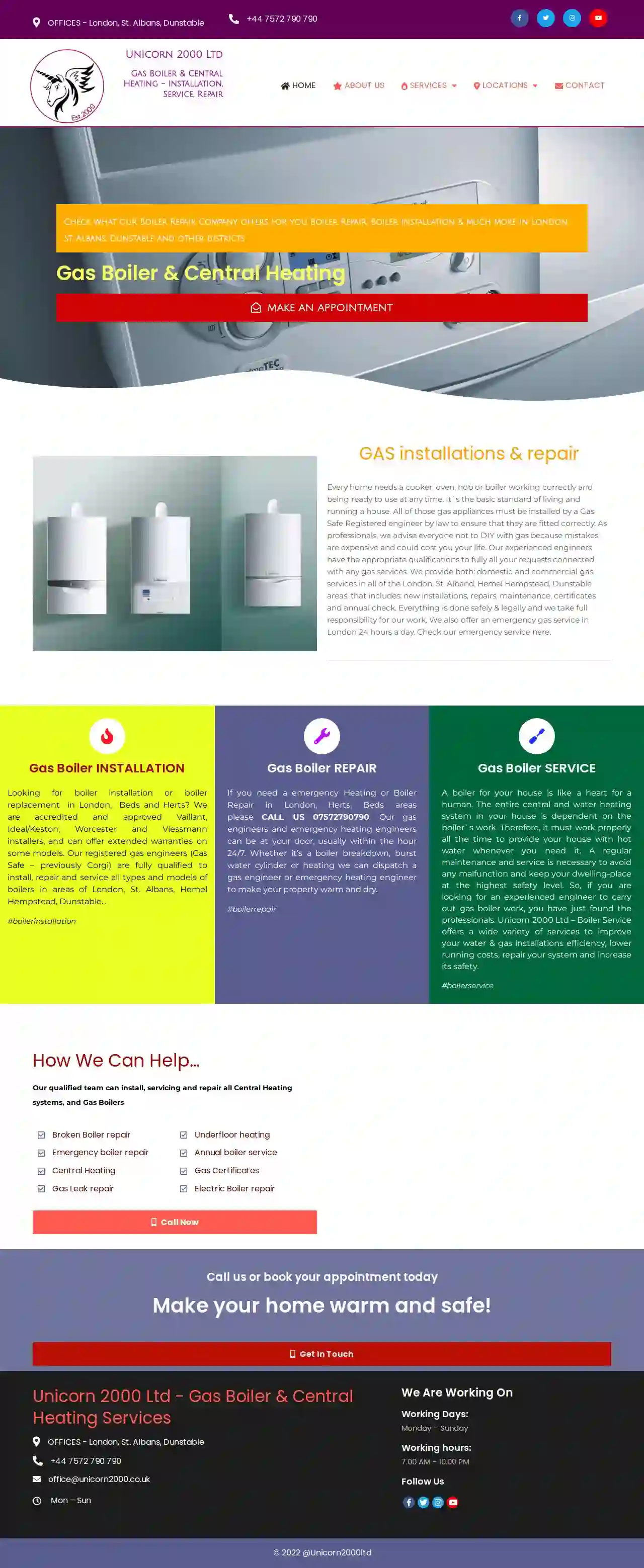
Unicorn 2000 - Gas Boiler Installation & Central Heating Services
510 reviewsDunstable, GBUnicorn 2000 Ltd is a Gas Safe registered company providing gas boiler and central heating services in London, St. Albans, Hemel Hempstead, and Dunstable. We offer a comprehensive range of services, including boiler installation, repair, and servicing, as well as central heating services for both domestic and commercial clients. Our experienced engineers are fully qualified to work on all types and models of boilers and are committed to providing safe and reliable service. We understand the importance of a working boiler for your home and offer a 24/7 emergency service to ensure you are never left without heat.
- Services
- Why Us?
- Accreditations
- Gallery
Get Quote
Air Conditioning & Smart Energy Solutions Ltd
512 reviewsSparrow Hall Farm, Unit 8B Barleyfields, Edlesborough, LU6 2ES, GBAir Conditioning & Smart Energy Solutions Ltd is an independent company with over 10 years of experience in the Air Conditioning Industry. We are approved installers for leading brands like Fujitsu, Mitsubishi Electric, Daikin, and Toshiba. Our team of F-Gas certified engineers are highly experienced in both commercial and residential installations. We pride ourselves on providing high-quality installations that are independently certified and accredited by Refcom. We also specialize in EV Charger Installations, undertaken by fully qualified electricians specifically trained for this purpose. We offer free surveys and fixed-cost quotations, ensuring transparency and peace of mind for our clients.
- Services
- Why Us?
- Accreditations
- Our Team
- Gallery
Get Quote
Over 12,692+ HVAC Contractors on our directory
Our HVAC experts operate in Sandy & beyond!
HVACCompaniesHub has curated and vetted Top HVAC Contractors in Sandy. Find the most trustworthy business today.
Frequently Asked Questions About Emergency HVAC Services
- Control Humidity: Keep indoor humidity levels between 30% and 50%.
- Regularly Change Air Filters: Change your air filters at least every three months.
- Clean Drip Pans and Condensate Drains: Regularly inspect and clean your AC unit's drip pans and condensate drains to prevent standing water.
- Ensure Proper Ventilation: Adequate ventilation helps to reduce moisture buildup.
- Schedule Professional Duct Cleaning: Consider regular air duct cleaning to remove mold and other contaminants.
- Uneven Temperatures: Some rooms in your house might be significantly hotter or colder than others.
- High Energy Bills: An undersized or oversized system will work harder and consume more energy.
- Frequent Cycling: An oversized system will turn on and off too frequently, which can lead to premature wear and tear.
- Poor Humidity Control: Incorrect sizing can cause inadequate humidity control.
- Insulate Pipes: Insulate exposed pipes in unheated areas, such as crawl spaces, attics, and garages.
- Seal Air Leaks: Seal air leaks and cracks in walls and foundations near pipes.
- Keep Thermostat Consistent: Maintain a consistent thermostat setting, even when you are away, to keep indoor temperatures above freezing.
- Open Cabinet Doors: Open cabinet doors under sinks to allow warmer air to circulate around pipes.
- Let Faucets Drip: During freezing temperatures, allow faucets to drip slowly to relieve pressure and prevent pipes from bursting.
How can I prevent mold in my HVAC system?
What's the difference between a single-stage and two-stage furnace?
How can I tell if my HVAC system is the correct size for my home?
How can I prevent frozen pipes in the winter?
How can I prevent mold in my HVAC system?
- Control Humidity: Keep indoor humidity levels between 30% and 50%.
- Regularly Change Air Filters: Change your air filters at least every three months.
- Clean Drip Pans and Condensate Drains: Regularly inspect and clean your AC unit's drip pans and condensate drains to prevent standing water.
- Ensure Proper Ventilation: Adequate ventilation helps to reduce moisture buildup.
- Schedule Professional Duct Cleaning: Consider regular air duct cleaning to remove mold and other contaminants.
What's the difference between a single-stage and two-stage furnace?
How can I tell if my HVAC system is the correct size for my home?
- Uneven Temperatures: Some rooms in your house might be significantly hotter or colder than others.
- High Energy Bills: An undersized or oversized system will work harder and consume more energy.
- Frequent Cycling: An oversized system will turn on and off too frequently, which can lead to premature wear and tear.
- Poor Humidity Control: The system may not effectively control humidity levels, leading to discomfort or mold problems.
How can I prevent frozen pipes in the winter?
- Insulate Pipes: Insulate exposed pipes in unheated areas, such as crawl spaces, attics, and garages.
- Seal Air Leaks: Seal air leaks and cracks in walls and foundations near pipes.
- Keep Thermostat Consistent: Maintain a consistent thermostat setting, even when you are away, to keep indoor temperatures above freezing.
- Open Cabinet Doors: Open cabinet doors under sinks to help prevent pipes from freezing.
- Let Faucets Drip: During freezing temperatures, allow cold water taps to drip slowly to keep water moving and prevent freezing.